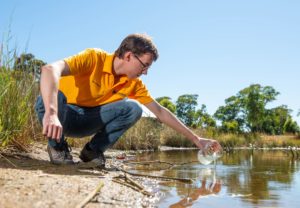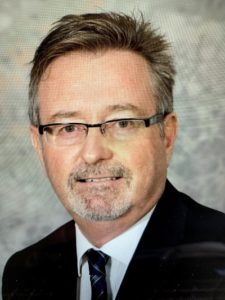
The Oaklands Park Wetlands Education Centre has won a national award for innovation and research, the Torrens Resilience Institute is part of a new drought hub to assist SA farms, and new grants will help researchers explore COVID-19’s broad social impact.
National recognition for wetlands classroom

The 2021 National Stormwater Awards saw Flinders University win the Innovation and Research award with Marion, LGA and the Managed Aquifer Recharge Users Group for Oaklands Park Wetlands Education Centre. The centre had previously won the 2020 SA award for excellence in innovation and research, being the centrepiece of the fully operational Oaklands Wetland that treats up to 400 million litres of stormwater each year. The Oaklands Education Centre is the first university-led laboratory in South Australia for schools, government agencies and environmental groups to conduct practical water experiments while learning how wetlands work. Flinders aquatic microbial ecologist Professor Howard Fallowfield says the teaching centre provides an opportunity for schools, community groups and researchers to get a better understanding of how wetlands can reduce water pollution and offer benefits for nearby communities. “These facilities are free to use and give our researchers practical opportunities to conduct research which ensures wetland water is safe for its intended use in the City of Marion,” says Professor Fallowfield. “In an SA first, the new centre also offers the unique opportunity for high school classes to be led by our PhD students using modules designed for the SACE curriculum. They will have the ability to tailor packages to the educational needs of students in years 9-12. Hopefully this positive first-hand experience in the field inspires more students to consider future tertiary education and career pathways in STEM sciences.” Further information about the award win and the Oaklands Wetland can be found on the Flinders newsblog.
New Drought Hub to assist SA farms

Flinders University’s Torrens Resilience Institute is part of a new drought resilience hub in South Australia which will undertake research, development and commercialisation activities to improve drought resilience and preparedness on farms. The South Australian Drought Resilience Adoption and Innovation Hub (SA Drought Hub) is one of eight in Australia established by the Australian Federal Government. The SA Drought Hub, which will receive $8 million of funding over four years from the Australian Government’s Future Drought Fund, will consist of a network of 59 grower groups, the three SA-based universities, government agencies, indigenous partners, agribusinesses, RD&E partners and industry organisations. The hub will also attract an additional $11.47 million of cash and in-kind support from the hub’s partners.
Matthew Flinders Fellow and Director of the Torrens Resilience Institute Professor Paul Arbon says the Institute will play a key role in developing and translating resilience science in the SA Drought Hub, working with partners to develop more resilient systems and new solutions. “The Torrens Resilience Institute members will bring a diverse range of disciplines to the problem including health, business, technologies and social sciences,” says Professor Arbon.
Each of the eight national hubs will bring together research and expertise that will support and facilitate effective testing and scaling up of new solutions into commercialisation and adoption. The initial focus will be to co-design and deliver drought resilience practices that will help agricultural industries to grow, even under conditions of drought – and link all industry sectors from grains, crops and livestock, to horticulture and viticulture.
Grants to explore COVID-19’s broad social impact
Flinders researchers having been successful in obtaining funding for new projects that address broad social areas that have been affected since the COVID-19 pandemic began. Professor Emma Thomas and Dr Ryan Balzan have been awarded $50,000 from Defence Science and Technology for the project titled Conspiracy and misinformation: COVID-19 and QAnon. This project focuses on the development and application of theories and conceptual frameworks to better understand the influential aspects and consequences of COVID-19 conspiracies, with the aim of informing nuanced strategies to counter their influence, and in doing so, enhance societal/systemic resilience.
Dr Helen McLaren, together with co-investigator Associate Professor Cassandra Star and international partners Dr Ida Widianingsih (Public Administration) and Dr Binahayati (Social Work) of the Universitas Padjadjaran in West Java, have won a $30,000 grant from the Australia-Indonesia Institute COVID-19 Fund for Action Research for the project titled Women’s interdisciplinary Round Table: COVID-19 and the Future of SDGs. The project aims to keep women’s rights at the forefront of original knowledge generation. The focus will be on understanding and strategising with women on future sustainable development goals, post COVID-19.
To help further more detailed medical advances, Flinders Health and Medical Research Institute COVID-19 Research grants have been awarded to two groups of applicants:
- Jing Jing Wang (CIA), Tim Chataway, Alex Troelnikov, David Gordon and Tom Gordon, to research “Molecular profiling of serum antibody responses following Covid-19 vaccination”.
- Jill Carr (CIA), Stuart Pitson, Bernard Flynn, Dani Dixon, Shailesh Bihari and James McEvoy-May, to research “Definition of the therapeutic action of inhibitors of dihydroceramide desaturase (des-1) against SARS-CoV-2 and COVID-19”.
There are also recipients of two FHMRI Collaboration Research grants: Jonathan Gleadle and Claus Oxvig (Arrhus University, Denmark) to study “The role of PAPP-A2 in renal compensatory hypertrophy”, and Dani-Louise Dixon and Martin McMahon (Huntsman Cancer Institute, University of Utah, USA) to study “Development of in vivo models to explore the molecular and immunological mechanisms of lung cancer in never smokers exposed to high levels of radon”.

